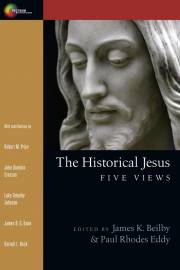 2011 Christianity Today Book Award winner!
2011 Christianity Today Book Award winner!
The scholarly quest for the historical Jesus has a distinguished pedigree in modern Western religious and historical scholarship, with names such as Strauss, Schweitzer and Bultmann highlighting the story. Since the early 1990s, when the Jesus quest was reawakened for a third run, numerous significant books have emerged. And the public’s attention has been regularly arrested by media coverage, with the Jesus Seminar or the James ossuary headlining the marquee.
The Historical Jesus: Five Views provides a venue for readers to sit in on a virtual seminar on the historical Jesus. Beginning with a scene-setting historical introduction by the editors, prominent figures in the Jesus quest set forth their views and respond to their fellow scholars.
On the one end Robert M. Price lucidly maintains that the probability of Jesus’ existence has reached the “vanishing point,” and on the other Darrell Bock ably argues that while critical method yields only a “gist” of Jesus, it takes us in the direction of the Gospel portraits. In between there are numerous avenues to explore, questions to be asked and “assured results” to be weighed. And John Dominic Crossan, Luke Timothy Johnson and James D. G. Dunn probe these issues with formidable knowledge and honed insight, filling out a further range of options.
The Historical Jesus: Five Views offers a unique entry into the Jesus quest. For both the classroom and personal study, this is a book that fascinates, probes and engages.
EDITORIAL REVIEWS
FROM BOOKLIST
Skeptical rationalists such as Reimarus and Strauss would never have guessed that their project of uncovering the historical Jesus would attract professing Christians. But here, in this provocative volume, readers find twenty-first-century Christians actually justifying that project as an obligation of their faith in the Incarnation. Readers thus hearÔÇöas one of the five researchers presented here in dialogueÔÇöfrom a Catholic scholar arguing that just as the study of history can help us learn about, say, Napol├®on or Socrates, so can it help us understand Jesus of Nazareth. A leading Evangelical researcher substantiates this point by explaining how historical inquiry illuminates JesusÔÇÖ place within a first-century Greco-Roman culture. Yet when an Episcopalian participant questions the very existence of a historical Jesus, arguing that the Gospels merely deliver mythic archetypes, not reliable narratives, readers may see why theologians such as K├ñhler and Barth warnedÔÇöas the editors acknowledgeÔÇöagainst seeking Jesus through historical scholarship rather than through the divine miracle of faith. Certain to spark sharp debate. –Bryce Christensen
